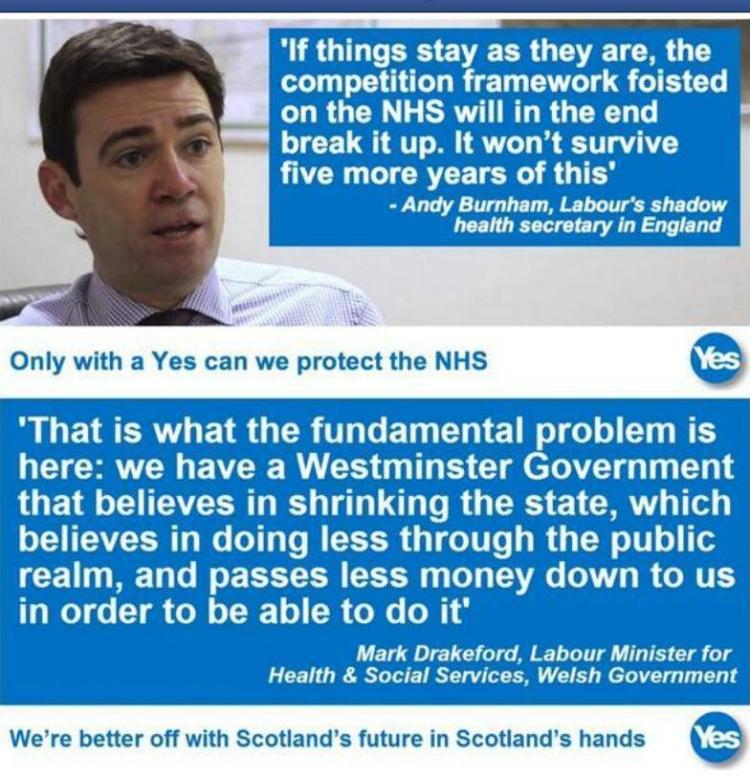As part of our state of the debate series, Paul Cairney discusses why the NHS is described as this week’s ‘key battleground’.
Well, what do I know? I thought that the Yes campaign argument – independence is the only way to protect the Scottish NHS – wouldn’t gain much traction. Instead, it is getting a lot of attention, perhaps at the expense of the currency issue, and is described as this week’s ‘key battleground’ by the Guardian and BBC – partly because concern for the NHS appears to prompt a rise in support for Scottish independence. No campaigners have become increasingly agitated about this claim – I have read a gazillion tweets about NHS ‘lies’, and Malcolm Chisholm MSP describes ‘the biggest lie of the Referendum campaign’ and ‘the biggest political lie of all my years in politics’.
So, what are the issues involved and what explains the direction of the debate so far?
I described this campaign as surprising because health policy has been devolved since 1999. Under devolution, over the last 15 years, the Scottish Government has been responsible for using a devolved budget that has generally been large, allowing it to develop or maintain distinctive health policies without much interference from the UK Government – including a rejection of the ‘internal market’ strategy pursued with great vigour in England.
Yet, in this ‘age of austerity’, things are beginning to change – allowing the Yes campaign to make three headline grabbing arguments:
1. The UK Government is cutting NHS spending in England, which has a knock-on effect for the Scottish budget via the Barnett formula.
2. The UK Government is pursuing a ‘privatisation’ agenda which, unless you vote Yes, the Scottish Government may be obliged to follow.
3. The right to free healthcare could be written into the constitution of an independent Scotland.
What brings these three arguments together is the idea that staying in the UK means sticking with the austerity agenda – with less money available for public services such as healthcare. The use of one or all of these arguments can be found in almost all of the Yes-friendly newspaper and social media messages so far, including by Lesely Riddoch, Humza Yousaf, Kate Higgins, and Dr Philippa Whitford.
For me, the argument seems exaggerated for three main reasons. First, since devolution, most UK Governments have been keen to boost or maintain funding for the NHS, at least during good times. In fact, the Scottish Government’s overall budget has risen markedly from 1999, and ‘real’ spending on health – i.e. adjusted for inflation, using the Treasury’s GDP deflator - rose by 68% from 2000-2011. The real change in the Scottish Government budget only became consistently negative from 2010-11 after almost a decade of budget increases (for more details, see the tables at the end of this post - http://paulcairney.wordpress.com/2014/08/18/vote-yes-to-save-the-nhs/, drawn from Cairney and McGarvey’s Scottish Politics).
Second, if there is a No vote, the Scottish Government will continue to spend a budget over which is has very high control. A change in the NHS budget for England does not mean a change in the NHS budget for Scotland. Rather, it affects the overall budget. Therefore, the big question is whether or not the overall Scottish Government budget would rise or fall after a Yes/ No vote. This is a much bigger question that goes beyond the NHS towards, for example, a discussion of Scotland’s fiscal policy, its share of UK debt, and its alternative ideas on austerity.
Third, so far, the ‘privatisation’ agenda in England relates to the use of the private sector to deliver services. The NHS remains tax funded and, in most cases, free at the point of delivery. Further, I can’t see a clear way in which the UK Government could oblige the Scottish Government to follow its lead. On the contrary – 15 years of devolution has shown us that Scotland can go its own way within the UK.
If so, why does the NHS story have so much traction? Three reasons come to mind:
1. The image of the NHS is so positive and strong that it can prompt regular attention (perhaps more so than education and policing – similar Yes campaigns have received less attention so far). If you talk about privatisation, and the fate of the NHS under the Conservative Party, you can tap into fears about the loss of an institution that is cherished in Scotland (compare with John McTernan’s praise of competition).
2. The survey question, to demonstrate the impact of NHS concerns on a Yes vote, is a wee bit leading: Does the prospect of an increased role of the private sector in the NHS in England having an adverse effect on the Scottish budget which funds NHS Scotland make you likely or unlikely to vote for an independent Scotland in the referendum? Indeed, I am surprised that only 46% said that it made them likely to vote Yes (35% No, 18% undecided).
3. The UK Labour Party has picked a bad time to warn voters in England that the NHS is in crisis, and treated by the Conservative-led government as ‘another utility to be broken up and privatised’. It has prompted the Yes campaign to suggest that its concerns are the concerns expressed by the most important party (in Scotland) involved in the No campaign – a point made repeatedly by Health Secretary Alex Neil in his statement on the 19th September, and by Yes campaign material:
This comes at a time when the NHS in England is described regularly as in crisis or near ‘collapse’. For every one story suggesting that the NHS budget in Scotland continues to rise, you may find several arguing that the NHS budget in England has been ‘clawed back’ (e.g. here, here and here).
Overall, the ‘save our NHS’ message is simple and could yet be effective. Who knew?



